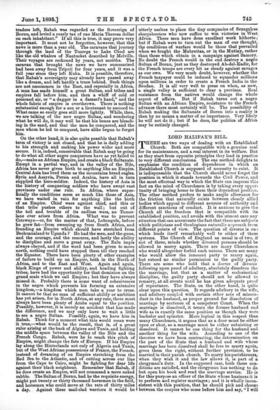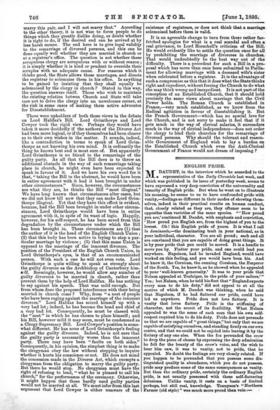LORD HALIFAX'S BILL. T HERE are two ways of dealing with
an Established Church. Both are compatible with a genuine zeal for its maintenance, and a real interest in its welfare. But as they start from opposite principles they lead in practice to very different conclusions. The one method delights to emphasise the condition of dependence in which an Established Church is supposed of necessity to exist. It is indispensable that the Church should never forget the position in which it stands towards the Civil Power, and the most effectual way in which the State can impress this fact on the mind of Churchmen is by taking every oppor- tunity of bringing home to them their dependent position. The other method prefers to make ample allowance for the friction that naturally exists between closely allied bodies which appeal to different sources of authority and different sanctions of conduct. It is anxious to give the Church all the freedom that is compatible with its established position, and avoids with the utmost care any situation that can accentuate the fact that there are subjects which politicians and theologians naturally approach from different points of view. The question of divorce is on3 which lends itself remarkably well to either of these systems. The Church of England as usual is of two, if not of three, minds whether divorced persons should be allowed to marry again. There are many Churchmen who would altogether forbid such unions. There are many who would allow the innocent party to marry again, but extend no similar permission to the guilty party. There are some who hold that a decree of divorce following upon proof of adultery, absolutely dissolves the the marriage, but that as a matter of ecclesiastical discipline, the guilty party should not be allowed to remarry, at all events until he has given adequate proof of repentance. The State, on the other hand, is quite clear upon this question. It regards adultery in the wife,. and adultery coupled with certain other acts of miscon- duct in the husband, as proper ground for dissolution of marriage by sentence of a competent Court. When the marriage is dissolved, it treats the former husband and wife as in exactly the same position as though they were bachelor and spinster. More logical in this respect than many Churchmen, it argues that as a door must be either open or shut, so a marriage must be either subsisting or dissolved. It cannot be one thing for the husband and another thing for the wife. According to one of the theories we have been contrasting, the determination on the part of the State that a husband and wife whose marriage has been dissolved shall be free to marry again, gives them the right, without further provision, to be married in their parish church. To marry his parishioners, when they wish it and the law allows it, is part of a clergyman's duty. In the supposed case, both these con- ditions are satisfied, and the clergyman has nothing to do but open his book and read the marriage service. He is for this-purpose an officer of the State whose business it is to perform and register marriages ; and it is wholly incon- sistent with this position, that he should pick and ehoow between the couples who come before him and say, "I will marry this pair, and I will not marry that." According to the other theory, it is not wise to force people to do things which they greatly dislike doing, or doubt whether it is right to do, if the desired end can be arrived at by less harsh means. The end here is to give legal validity to the remarriage of divorced persons, and this can be done equally well whether they are married in church or at a registrar's office. The question is not whether these scrupulous clergy are scrupulous with or without reason ; it is simply whether it is kind or prudent to override their scruples with no adequate cause. For reasons which it thinks good, the State allows these marriages, and directs the registrar to solemnise them in his office. Is anything to be gained by insisting that they shall equally be solemnised by the clergy in church ? Stated in this way, the question answers itself. Those who wish to maintain the existing relation betwen Church and State will take care not to drive the clergy into an unwelcome corner, at the risk in some cases of making them active advocates for Disestablishment.
There were upholders of both these views in the debate on Lord Halifax's Bill. Lord Grimthorpe and Lord Cowper took the rigid view. Perhaps they would have taken it more decidedly if the authors of the Divorce Act had been more logical, or if they themselves had been clearer as to their own wishes in the matter. It sounds, indeed, like a contradiction in terms to speak of Lord Grim- thorpe as not knowing his own mind. It is ordinarily the thing he knows best and is most sure of. But apparently Lord Grimthorpe is no friend to the remarriage of the guilty party. As all that the Bill does is to throw an additional obstacle in the way of such remarriage taking place in church, he might even have been expected to speak in favour of it. And we have his own word for it that, " taking the Bill in the abstract, he would have been in entire agreement with it had it been brought in under other circumstances." Since, however, the circumstances are what they are, he thinks the Bill "most illogical" We have long known that circumstances alter cases, but we did not know till now that they can make Lord Grim- thorpe illogical. Yet that they have this effect is evident, because, had the Bill been brought in under other circum- stances, Lord Grimthorpe would have been in entire agreement with it, in spite of its want of logic. Happily, however, for his self-respect, he has been saved from this degradation by the circumstances under which the Bill has been brought in. These circumstances are (1) that the author of it is the head of the English Church Union ; (2) that this body has been active in trying to stop a par- ticular marriage by violence ; (3) that this same Union is opposed to the marriage of the innocent divorcee. The position of the President of the English Church Union, in Lord Grimthorpe's eyes, is that of an excommunicated person. With such a one he will not even vote. Lord Grimthorpe is quite willing to speak as strongly about the guilty divorcee as the Archbishop of Canterbury him- cif. Seemingly, however, he would allow any number of guilty divorcees to be married in church, rather than prevent them by the help of Lord Halifax. He has nothing to say against his speech. That was mild enough. But from whom does the proposed interference with their being married in church come ? Why, from " a nest of people who have been raging against the marriage of the innocent divorcee." Lord Halifax has mixed himself up with a very bad lot ; indeed, he has become the head and chief of a very bad lot. Consequently, he must be classed with the " nest " in which he has chosen to place himself ; and his Bill, however mild it may seem, must be condemned as a Clergy Supremacy Bill. Lord Cowper's position is some- what different. He has none of Lord Grimthorpe's feeling against the guilty divorcee. Indeed, he is not sure that the guilty party is necessarily worse than the innocent party. There may have been " faults on both sides." Consequently, in his opinion, the simplest thing is to make the clergyman obey the law without stopping to inquire whether it hurts his conscience or not. He does not mind the concession made in the Divorce Act, which exempts a clergyman from the obligation to marry the guilty party. But there he would stop. No clergyman must have the right of refusing to lend, " what he is pleased to call his church," for the performance of the ceremony. Otherwise, it might happen that these hardly used guilty parties would not be married at all. We must infer from this last argument that Lord Cowper is either unaware of the existence of registrars, or does not think that a marriage solemnised. before them is valid.
It is an agreeable change to turn from these rather far- fetched apologies for what is a real scandal and often a real grievance, to Lord Herschell's criticism of the Bill. He would evidently like to settle the question once for all by prohibiting the marriage of divorcees in churches. That would undoubtedly be the best way out of the difficulty. There is a precedent for such a Bill in a pro- posal which has more than once been submitted to Parlia- ment for allowing marriage with a deceased wife's sister when celebrated before a registrar. It is the advantage of such a compromise as this that it does what the State thinks right and expedient, without forcing the Church to do what she may think wrong and inexpedient. It is not part of the conception of an Established Church, that it should hold precisely the same views about marriage that the Civil Power holds. The Roman Church is established in France,—very much established, as we know from the Radical agitation in favour of disestablishing it. But the French Government—which has no special love for the Church, and is not sorry to make it feel that if it gets much in the way of clerical salaries, it surrenders much in the way of clerical independence—does not order the clergy to lend their churches for the remarriage of divorced persons. Why should the tolerant and reason- able Government of England wish to lay a burden on the Established Church which even the Anti-Clerical Government of France would not dream of imposing ?







































 Previous page
Previous page